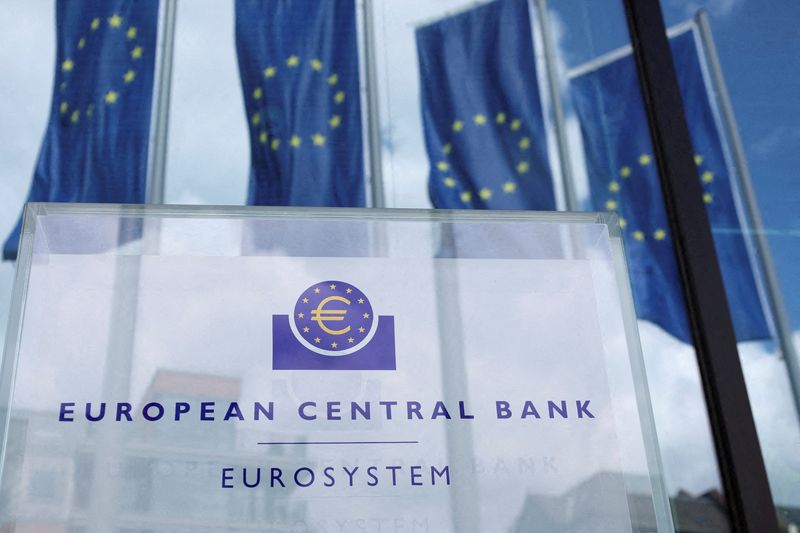By Yoruk Bahceli and Joice Alves
LONDON (Reuters) -Traders' bets on a large European Central Bank interest-rate hike this week evaporated quickly on Wednesday as a rout in Credit Suisse (SIX:CSGN) shares fanned concern about the health of Europe's banking sector.
The ECB has contacted banks on its watch to quiz them on their exposure to the struggling Swiss lender, two supervisory sources told Reuters.
Money market pricing suggested traders now saw less than a 20% chance of a 50 basis point rate hike at Thursday's scheduled ECB meeting.
That's down from as high as 90% at the start of the session, when a source-based story saying ECB policymakers were leaning towards a half-percentage-point rate hike was published.
Credit Suisse shares slid to a new record low, after its largest investor said it could not provide the Swiss bank with more financial assistance, extending days of turmoil in financial markets that followed the sudden collapse of U.S.-based Silicon Valley Bank.
Market pricing now suggested a smaller, more cautious 25 bps move, was now anticipated.
"The instability has raised questions if the ECB will go ahead and raise rates by 50 bps as originally planned tomorrow," said Societe Generale (EPA:SOGN) analyst Kenneth Broux.
While rapidly rising interest rates across major economies have raised concern about potential pressure points, many analysts still expected a large ECB hike given high inflation.
"The risk that they do 25 bps (or nothing) is not zero but it is low, as it would send a terrible signal to the market," said Frederik Ducrozet, head of macroeconomic research at Pictet Wealth Management.
"Rather, the ECB might communicate on the support measures and backstop facilities they could put in place in order to make sure that banks have sufficient access to liquidity at any time."
As unease spread, the euro slid 1.8% against the dollar, its biggest one-day drop since the height of the COVID-induced market turmoil of March 2020.
Markets now priced euro zone rates would peak at around 3% this year, down from 4% last week.
Germany's two-year government bond yield, sensitive to interest rate expectations, plunged 52 basis points at 2.42%, and the gap between Italian and German government bond yields moved back towards 200 bps.
TOOLKIT
Analysts also said that banking fears spreading to Europe through Credit Suisse could prompt the ECB to announce a new liquidity backstop.
Were the ECB to announce a facility, Danske Bank chief analyst Piet Christiansen, said it could be a one-year liquidity operation acting as a backstop at the average deposit rate, compared to current weekly and three-month operations at the more punitive main refinancing operations rate.

Pictet's Ducrozet said the ECB could also ease collateral rules for banks, though not as much as the Federal Reserve. Eventually providing new, ad-hoc loans to banks may be more effective, he added.
"Between now and tomorrow a lot can change so Lagarde can make the reference that they (the ECB) have the tools available to use if they need to," said Marchel Alexandrovich, European economist at Saltmarsh Economics.